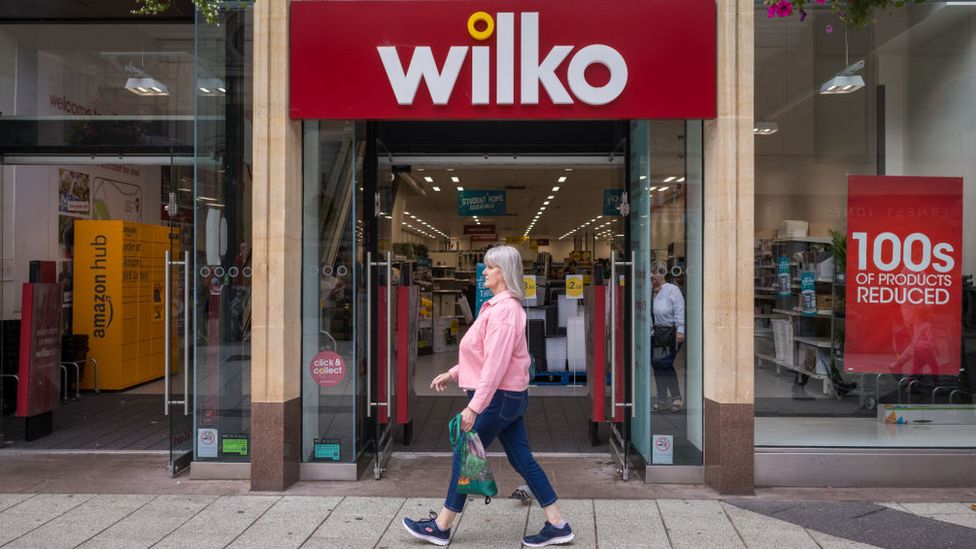The retailer is in administration but that doesn't necessarily mean it will disappear from the High Street.

The majority of Wilko shops are set to disappear from Britain 's high streets with hopes of finding a buyer for the whole business dwindling.
The cash-strapped chain announced earlier this month it was entering into administration, putting 12,500 jobs and its 400 stores at risk.
PwC has been searching for a buyer for Wilko, but has said interest is not focused on buying the whole business.
It warned redundancies for its staff and shop closures are likely.
Administrators PwC say that in the immediate term, all Wilko stores remain open and continue to trade, and that staff continue to be paid.
But with a buyer for the whole business looking unlikely, PwC has said it is "likely that there will be redundancies and store closures in the future".
The GMB union representing workers at Wilko has said the majority of stores are to close "within weeks", after a purchase fell through, but added some might be bought by other companies.
Its national secretary, Andy Prendergast, has said the union will seek to ensure its members "receive every penny" they are entitled to, with "significant job losses" on the cards.
Several retailers including Tesco, Aldi, Home Bargains, Toolstation and Dunelm have offered Wilko staff the chance to apply for roles, with the latter stating Wilko employees will be guaranteed an interview.
PwC has admitted there is interest in parts of Wilko's business, which might mean the 90-year-old High Street brand could survive.
But any deals would need to be concluded quickly, says Jeremy Whiteson, a restructuring and insolvency partner at law firm Fladgate, as PwC's fees for acting as administrator are mounting along with other costs such as continuing to pay staff wages.
Wilko is a business that ran out of time and money. No-one was prepared to stump up the £75m or so that was needed straight away to get the discount homeware chain back on track and pay suppliers to fill its sparse shelves.
Now the chain is in administration, a potential buyer would not be responsible for any of Wilko's debts, making a purchase more attractive.
The BBC understands there is interest, including from two retailers, and administrators say that discussions are ongoing but point out the parties are only interested in buying parts of the business.
There has been speculation that Wilko rivals including B&M, Poundland, The Range and Home Bargains could be among those interested in the firm, but none has commented on the rumours.
If a rival does buy Wilko, it raises a question about the survival of the brand. On the other hand, a turnaround specialist could make an offer to take Wilko on, albeit in a smaller form.
Tania Clench, an insolvency expert at law firm Cripps, said that if Wilko survives its brand "will be in need of a revamp".
If a rescue deal isn't possible, then Wilko will go into liquidation and start to be wound down.
Wilko has been a stalwart of Britain's high streets for decades. For that reason, its demise would have "significant implications" for other businesses, according to the British Independent Retailers Association (Bira).
"Its plight serves as a stark reminder of the challenges faced by traditional retailers in an ever-evolving market environment," said Andrew Goodacre, chief executive of the trade body.
The retailer has faced fierce competition in recent years from rivals B&M, Home Bargains, The Range and Poundland.
Many of its 400 stores are also located in High Streets where costs are generally higher, whereas its competitors are often found in retail parks.
But for Nzinga Zee Orgill who works at The Brickhouse, a bar in Slough across the road from a Wilko shop, the long-standing store is "absolutely essential" for people in the area.
"It's a reason why people come to this part of the High Street, without it being here there are very little options left," she said.
New figures from the British Retail Consortium (BRC) show some 6,000 shops have closed in Britain in the past five years, with high streets in the North and Midlands seeing the most empty stores.
Helen Dickinson, chief executive of the BRC, said the government must review a "broken business rates system".
Business rates are a kind of tax for commercial properties, which critics say have not kept up with changes in retailing and put bricks-and-mortar traders at a disadvantage to their internet-only rivals.
Among Wilko's portfolio of shops are 20 that used to belong to Woolworths, a much-loved homeware retailer that went bust in 2008.
Now Wilko could be heading towards the same fate.
Wilko closed its defined benefit pension scheme to new members a decade ago, but nearly 2,000 people will want to know what will now happen to their retirement payments.
The BBC understands that there is a shortfall of around £50m in Wilko's pension pot.
More than 740 workers are currently claiming their pensions, according to independent pension consultant John Ralfe. A further 1,145 are contributing to the fund but are not yet of pension-claiming age.
Mr Ralfe said that when a company collapses, it may not have enough assets to sell to plug any holes in its pension fund.
However, he reckons Wilko will have sufficient assets to offload to cover any shortfall.
For now, Wilko's pension scheme will be assessed by the Pension Protection Fund (PPF), which protects a company's retirement fund if the firm becomes insolvent.
A PPF spokesperson said: "We understand this must be a worrying time for the pension scheme members and we'd like to assure those members that we're here to protect them if needed."